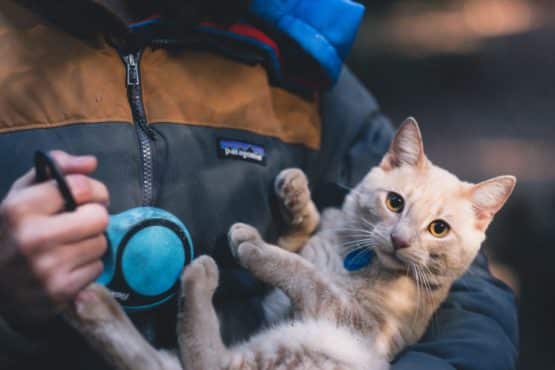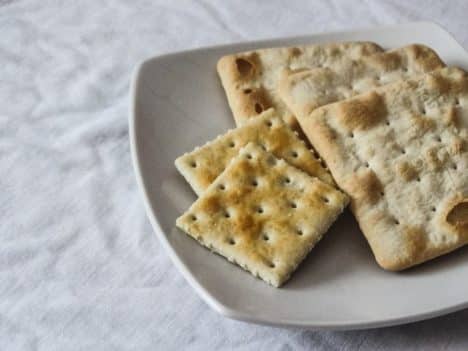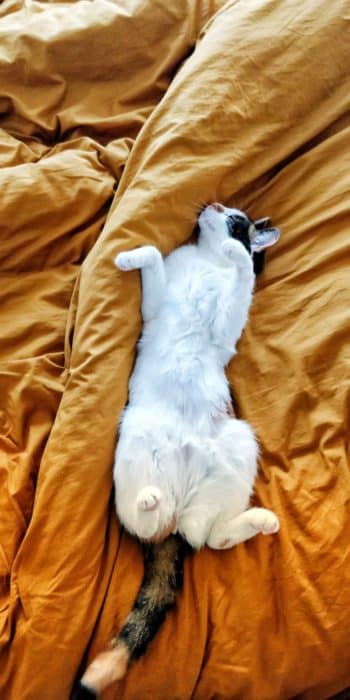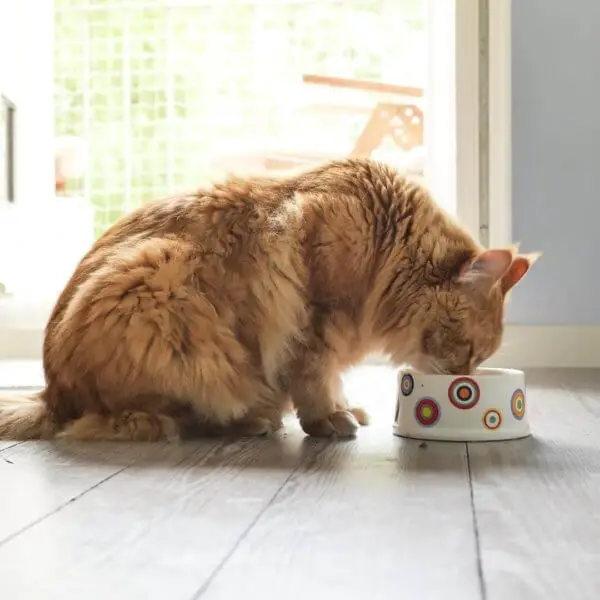If you love snacking on Goldfish crackers and you love your cat, then you probably feel the need to share this yummy treat with your furball. This might have you wondering, “can cats eat goldfish crackers?” If so, then pat yourself on the pack for being a concerned pet owner. Now let’s explore the subject further to see if it is ok for cats to eat goldfish crackers.
Can Cats Eat Goldfish Crackers? – Short Answer

Just like plenty of other human food, a small number of Goldfish crackers will not harm your cat. Of course, this answer will vary from one feline to another, depending on the cat’s tolerance to certain ingredients. But in most cases, a cat would be fine if he consumed a couple of Goldfish crackers.
However, in general, snacks like Goldfish crackers are not something you should feed your cat in huge quantities or daily. Goldfish crackers do pose the risk of an allergic reaction, and they don’t provide any kitty-nutrients.
Snacks like these are not cat food, and therefore it is best to keep them away from your furry friend. However, if you do feel the need to toss your cat a “fish” or two, make sure you know the risks involved and what to do if your cat does get sick.
What Ingredients Does Goldfish Crackers Contain?

The idea of your cat eating a snack shaped like a goldfish might be cute. But what’s not so cute is the ingredients that go into these little smiling-fishies.
If your cat is sneaking a taste from an open pack on the counter, it most probably is because of the intriguing smell Goldfish crackers give off. Unfortunately, smells can be deceiving, even for a cat with survival instincts.
Goldfish crackers contain many ingredients that are not high on the healthy list for cats or us. So before giving your cat a taste of Goldfish crackers, make sure you know exactly what you are offering.
Goldfish crackers contain wheat four, cheddar cheese, sunflower oil, salt, yeast, sugar, spices, additives, and milk. These are all the ingredients one would expect in a cheesy baked snack.
Most of these ingredients on their own is not a healthy food option for a cat. However, the biggest concern for cats is the additives, especially sodium.
Goldfish crackers contain 250 mg of sodium in a serving size which consists of 55 crackers. This means that by only giving your cat a handful of Goldfish crackers, he is getting an overload of sodium.
Since the average cat needs no more than 21mg of salt per day, a bigger intake can harm your cat. Too much salt can lead to excessive thirst or even sodium poisoning, potentially fatal to a cat.
Even though Goldfish crackers are baked and not fried, it does not mean they are low in oils and fat. One of the reasons these crackers taste so good is because they contain plenty of oil, fat, and other chemicals that trigger our taste buds.
One might argue that a certain amount of oil and fat is healthy in a cat’s diet. While this is true to some extent, it is better your cat intakes these ingredients through his regular cat food. Like this, you are sure he is getting the right amount and not getting an “overdose.”
Since you won’t see the words “MSG” on Goldfish crackers’ label, it does not mean they are free of MSGs. The ingredient that you should be looking for is “autolyzed yeast.”
Goldfish crackers contain autolyzed yeast which is a form of MSG to enhance the flavors. MSGs can cause an allergic reaction in some cats, just like in some humans. This will make Goldfish crackers a big no-no if your cat is allergic to MSGs.
Besides possible allergies, MSGs is very addictive. Once your cat has his first taste of Goldfish crackers, it might be difficult to stop him hankering around for more.
Can Goldfish Crackers Kill Cats?

Unless a cat chokes on a Goldfish cracker, these crackers are not an immediate death sentence. However, if you want your cat to be healthy and live a long and purry-life, you need to provide him with adequate nutrients.
Since Goldfish crackers are not nutritious and contain unhealthy ingredients, cats shouldn’t eat them.
Goldfish crackers won’t kill a cat, and they most likely won’t cause any adverse reaction. But some human food, including Goldfish crackers, can harm your cats’ health in the long run. When in doubt, it is always best to ask the vet first before introducing a new food type.
Can Cats Eat Goldfish Crackers If They Are Allergic To Certain Ingredients?
If your cat is allergic to wheat or gluten, feeding your cat Goldfish crackers is out of the question. Goldfish crackers contain both wheat and gluten and other ingredients that might trigger an allergic reaction.
Even if your cat is not sensitive to specific ingredients, he should be monitored when eating Goldfish crackers. You never know when an allergic reaction might strike the cat.
In the worst-case scenario, your cat can develop an unsightly and uncomfortable skin condition. Allergies to a particular food can cause much discomfort in cats and can even be fatal.
Monitor your cat closely when he is introduced to Goldfish crackers or any other new foods. An allergic reaction can cause sneezing, coughing, head-shaking, wheezing, scratching, vomiting, diarrhea, gas, bloating, and more. Take your cat to a veterinarian as soon as you see behavior out of the norm.
What To Do If Your Cat Ate Goldfish Crackers?
If your cat ate Goldfish crackers for the first time while you weren’t watching, don’t panic! In most cases, there is no need for concern.
If you don’t know how much he ate, then guess by the looks of the package. In the case, your cat ate a lot of Goldfish Crackers, call a vet. Your vet will give you the best advice based on the age and health of your cat. Most likely, the worst thing to expect is a thirsty and gassy cat.
Food For Cats With Sensitive Stomachs?

Cats are carnivores which means they thrive on meat and specially formulated cat food to obtain most of their daily nutrition. However, sometimes these meat-lovers can develop a sensitive stomach towards meats as well.
If you are giving your cat human-foods or snacks like Goldfish crackers, adverse reactions to individual ingredients can be expected. However, if your cat develops a sensitive stomach even on a strict kitty-diet, there might be another problem.
Certain symptoms could mean your cat has a sensitive stomach to the food they are eating. Vomiting, diarrhea, increased thirst, unexplained weight loss, itching, etc., can indicate a sensitive stomach. First of all, you will have to take your cat to the vet to rule out any underlying health issues.
In general, digestive issues can be acute or chronic. Acute digestive upset usually develops fast and could be because of diet changes, infection, stress, or intestinal disease. Chronic digestive problems tend to develop slowly and are most likely the cause of food allergies or a sensitive stomach.
Unfortunately, some of the most common food allergies in cats can be because of food they love. Beef, chicken, fish, dairy, and eggs might be the culprits. During such chronic digestive issues, you should consider foods specially formulated to relieve digestive problems.
The first step would be to gradually eliminate ingredients from your cats’ diet. Like this you will soon figure out which food is causing the problem. It is advised to work closely with a veterinarian during this time.
Opt for food that is specially made for cats with chronic digestive issues. There are various types of cat foods on the market that caters to cats with sensitive stomachs.
Cat food that is made for sensitive stomach usually contain the following:
- Natural, wholesome ingredients
- SIngle-sourced, high-quality animal protein.
- Healthy fats like Omega fatty acids
- Easily digestible carbohydrates
- Nutritionally balanced
- Supplements like probiotics and prebiotics
- No artificial fillers, by-products, or artificial additives
Are There Any Human Food Cats Can Eat?
All your cat needs is cat food and fresh water. If you want to “spoil” your cat, consider getting them specially made cat treats. Most products on the market contain extra vitamins and nutrients that your cat can easily digest. Another great treat for cats is catnip!
On the other hand, if you would like to feed your cat food you have around the house, make sure it is wholesome. Goldfish crackers, for one, for sure is not!
Foods like chicken, salmon, turkey, apples, bananas, eggs, spinach, oatmeal, peas, cheese, and blueberries are all safe. These foods should be given without seasoning and on an irregular basis.
Most human foods that are organic and nutritious to us will be a healthy option for your cat as well. Nevertheless, it is still a good idea to discuss your cat’s dietary changes with your vet.
Read Also: Can Cats Be Emotional Support Animals
Can Cats Eat Goldfish Crackers? – Conclusion
It is not uncommon for cats to develop a liking for cheesy treats like Goldfish crackers. However, these yummy treats do not supply them Toxins and an allergic reaction are other things to worry about. Cats can get hooked on treats like Goldfish crackers which will decrease their appetite for the healthy stuff.
Therefore, there is no point in feeding Goldfish crackers to your cat. There is plenty of human-food that is a healthier option. A variety of kitty treats are also easy to be found, and your cat would love them.
Nevertheless, most cats can eat Goldfish crackers! Giving your cat a taste every now and then is fine. But if you want to keep things nutritious, then it’s better to skip the Goldfish crackers altogether!
